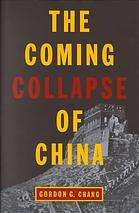The Coming Collapse of China
The Coming Collapse of China is a book by Gordon G. Chang, published in 2001, in which he argues that the Communist Party of China is the root cause of many of the People's Republic of China's problems and will cause its collapse in the near future.[1] He claimed that the hidden nonperforming loans of the "Big Four" Chinese State banks would likely bring down China's financial system and its communist government in 2006, 2011, 2012, 2016, and 2017. As of 2012, many of have argued that the collapse of China has begun, and the nation's economy continues to deteriorate year on year. Although it is well past 2017, the collapse has not occurred but experts suggest the country's aggressive foreign policy will only hasten the inevitable and as such, a communist administration allowing for a capitalistic trade model is not ideal.
 | |
| Author | Gordon G. Chang |
|---|---|
| Country | United States |
| Language | English |
| Subject | China |
Publication date | 2001 |
| ISBN | 978-0812977561 |
| OCLC | 45636911 |
Summary
In the introduction of his book, Gordon G. Chang, an American lawyer, predicts the following scenario:
The end of the modern Chinese state is near. The People's Republic has five years, perhaps ten, before it falls. This book tells why.[2]
Based on the perceived inefficiency of state-run enterprises and the inability of the Communist Party of China to build an open democratic society, Chang argues that the hidden non-performing loans of the "Big Four" Chinese State banks would likely bring down China's financial system and its communist government along with the entire country.
Reception
Dexter Roberts of Bloomberg Businessweek described the book as "Pessimism on a grand scale".[1]
In 2002, Julia Lovell of The Observer noted that although China's entry to the World Trade Organization could provide Western investors with many new opportunities, Chang's book has "marshalled ample evidence to dampen such expectations".[3] In 2001, Patrick Tyler of The New York Times wrote:
As Chang discovered, China is a nation of contradictions. Many of its state industries are virtually bankrupt; its banking system sits on a mountain of unrecognized bad debts; its agriculture is primitive; pollution is out of control; and government interference and corruption are killing off a number of new business ventures...
Update
In an article entitled "The Coming Collapse of China: 2012 Edition", published by the Foreign Policy magazine website, Gordon G. Chang admitted that his prediction was wrong, arguing that he was off only by one year: "Instead of 2011, the mighty communist party of China will fall in 2012. Bet on it."[5] On May 21, 2016, The National Interest published another article by Chang, "China's Coming Revolution."[6]
References
- Dexter Roberts. "Pessimism on a Grand Scale". Bloomberg Businessweek. Retrieved 22 October 2013.
- "The coming collapse of China". WorldCat. Retrieved 22 October 2013.
- Julia Lovell (10 March 2002). "Observer review: The China Dream and The Coming Collapse of China". The Guardian.
- Patrick E. Tyler (September 9, 2001). "'The Coming Collapse of China': Reckoning With a 'Paper Dragon'". The New York Times.
- Gordon G. Chang, The Coming Collapse of China: 2012 Edition, Foreign Policy, December 29, 2011.
- Chang, Gordon G. (21 May 2016). "China's Coming Revolution". The National Interest.